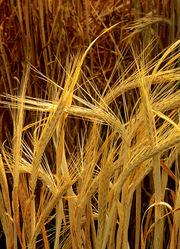
First it was hops and the hop shortage a few years ago. Now it seems that barley is going to conspire to raise the price of your favorite beverage - beer.
According to a study commissioned by Molson Coors, farmers in Britain are blaming a lack of rain for a poor barley crop. A full 94 percent of 259 farmers surveyed said the dry weather has impacted the barley crop. 40 percent said the dry conditions had a very profound negative affect on the crop. The Molson Coors study found that two thirds of Britain's arable farmers were affected.
How does this affect you? Well, first of all it is supply and demand at work. If there is a shortage of barley in Britain, then they will need to supplement the supply by importing. That will put more upward pressure on barley prices in other countries like Canada and the United States.
Britain's distilling and brewing industries depend on 1.7 metric tons of high-quality barley from UK farmers every year. Last springs dry weather had a major impact on 32 percent of barley farmers. Predictions for 2012 are for an even dryer spring which could cause major supply disruptions.
On top of that, predictions from the European Union’s RMI Agricultural Forecast, Feb, 2012 predict that 17 percent of barley farmers are planning on reducing the amount of barley planted over the next five years. This is a possible cut of 96,000 hectares of high quality malting barely fields.
Jerry Dyson, raw materials manager at Molson Coors explains the problem:
“Weather conditions always play a major role in both the availability and the quality of malting barley and this was brought into sharp focus most recently with the winter malting barley crop of 2011. The very dry spring meant that the winter barley crop had a very high nitrogen level, which significantly reduced its value for brewing.”
NFU chief arable adviser Guy Gagen said: “Winter barley has traditionally been seen as a crop tolerant of summer drought as it ripens from early summer. With another dry winter crops are at risk again. Farmers can and will take steps in an effort to cope, but there is much more that could be done with more co-ordination at the center.”
